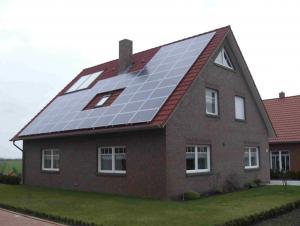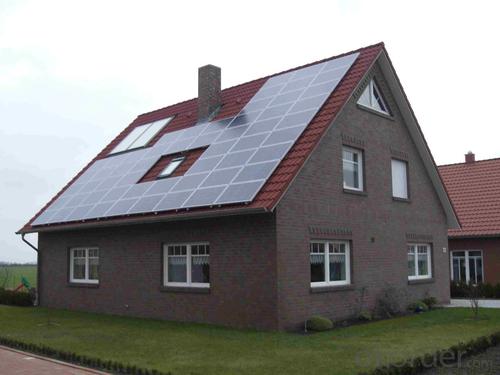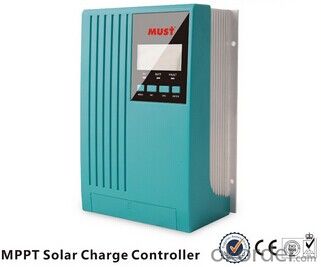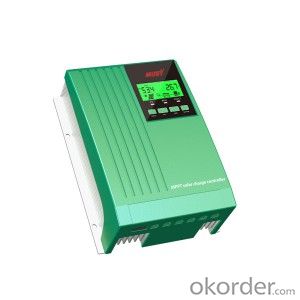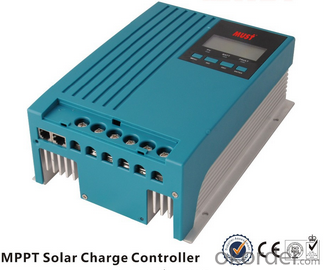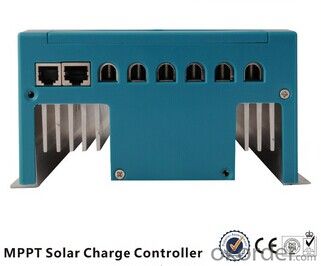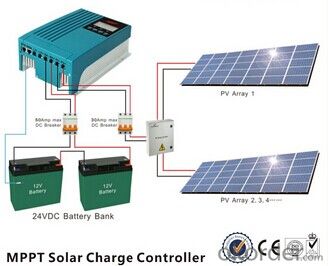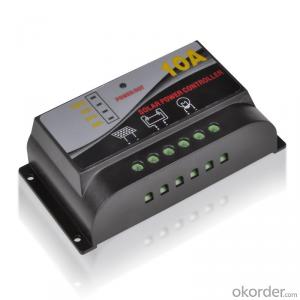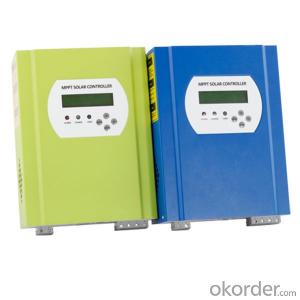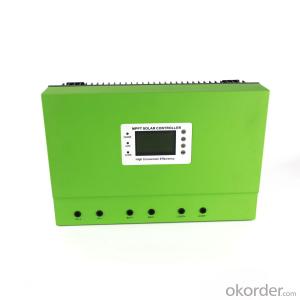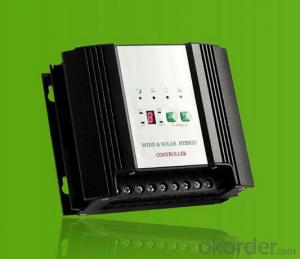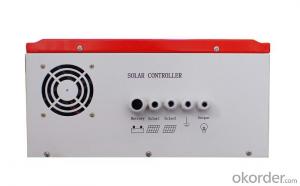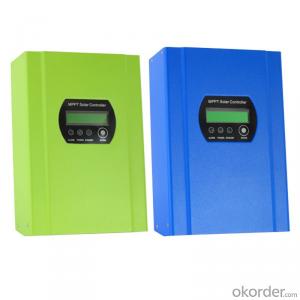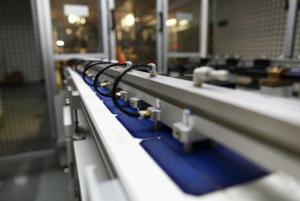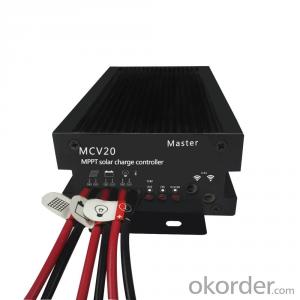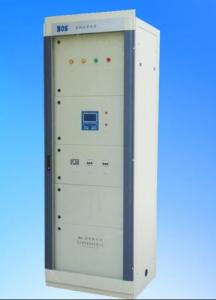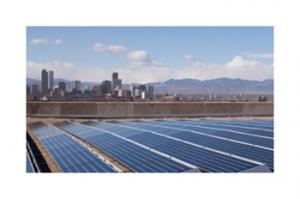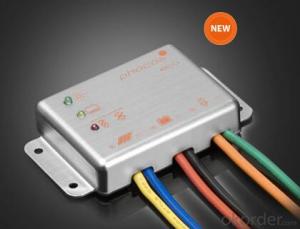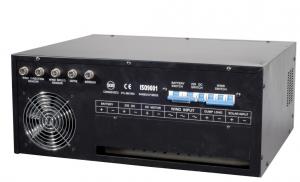Best Rv Solar Charge Controllers - MPPT Solar Charger Controller 20A/30A/40A for Solar System
- Loading Port:
- Shekou
- Payment Terms:
- TT or LC
- Min Order Qty:
- 50 pc
- Supply Capability:
- 100000 pc/month
OKorder Service Pledge
OKorder Financial Service
You Might Also Like
MPPT Solar Charger Controller 20A/30A/40A for Solar System
Power Range: 20-40A
20/30/40A MPPT solar charge controller
12V/24V auto work, MPPT efficiency>99%
peak conversion efficiency>98%
DSP processors architecture ensure high speed and performance.
1. MPPT Solar Charger Controller Characteristics:
20/30/40A MPPT solar charge controller
PV input:100V or 145V max
12V/24V auto work
MPPT efficiency>99% ,peak conversion efficiency>98%
DSP processors architecture ensure high speed and performance
Four-stages charging method
Protection: PV array short circuit, PV reverse polarity, battery reverse polarity, over charging, output short circuit
2. MPPT Solar Charger Controller specifications:
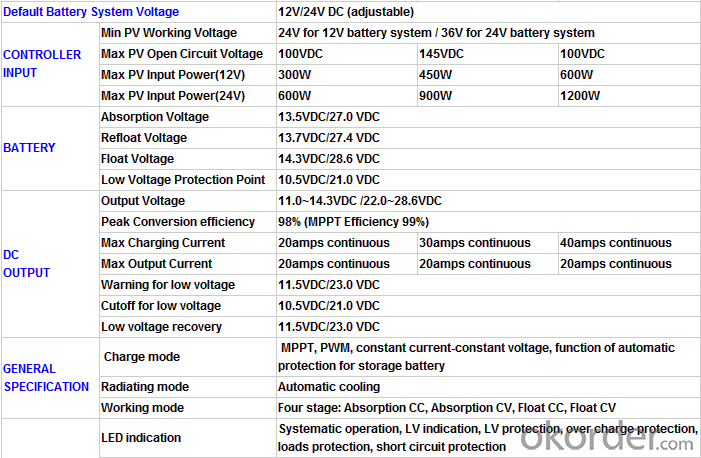
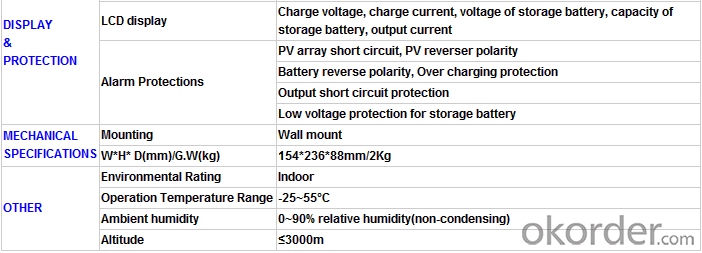
3. MPPT Solar Charger Controller Production Line:
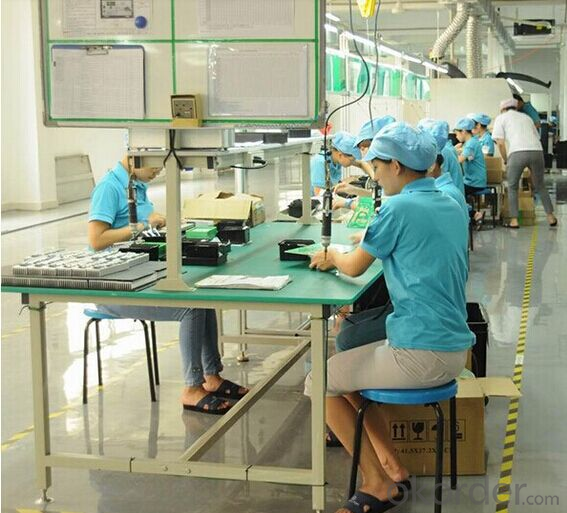
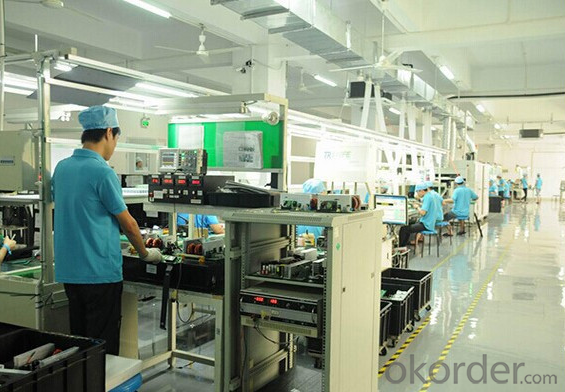
4. MPPT Solar Charge Controller Package:

5. MPPT Solar Charger Controller FAQ:
We have organized several common questions for our clients, may help you sincerely:
1. How to choose a right solar controller?
Tell us your demand, then our sales will recommend a suitable one to you.
2. What is the solar inverter warranty?
Our product warranty is valid for 12 months after delivery. We undertake to repair any malfunctioned units due to defective components of inadequate workmanship ,but specially expecting any defects resulting from normal wear and tear of improper use of the products.
3. How long can we receive the product after purchase?
a.sample orders will be delivered from our factory within 7working days .
b.General orders(under 2000pcs) will be delivered from our factory within 25 working days.
c. Bulk orders (over 2000pcs )will be delivered from our factory within 35 working days at most
4. What is the payment term?
T/T (Telegraphic transfer) / Letter of credit
- Q: What is the maximum output voltage for a solar controller?
- The maximum output voltage for a solar controller typically depends on the specific model and specifications. However, in general, most solar controllers have a maximum output voltage of around 12 to 24 volts, which is suitable for charging batteries or powering low-voltage devices.
- Q: How do solar controllers protect batteries?
- Solar controllers protect batteries by regulating the flow of electricity from the solar panels to the batteries. They prevent overcharging by monitoring the battery voltage and disconnecting the panels when the battery is fully charged. Additionally, they prevent deep discharge by disconnecting the load from the battery when its voltage drops below a certain threshold, thus prolonging battery life and ensuring its optimal performance.
- Q: Can a solar controller be used with solar panel anti-islanding protection?
- Yes, a solar controller can be used with solar panel anti-islanding protection. In fact, it is recommended to use a solar controller in conjunction with anti-islanding protection to ensure the safe operation of the solar panel system. A solar controller helps regulate the charging and discharging of the batteries, preventing overcharging or over-discharging. On the other hand, anti-islanding protection is a safety mechanism that disconnects the solar panel system from the grid in the event of a power outage or grid failure, preventing the solar panels from energizing the grid and potentially causing harm to utility workers. By using both a solar controller and anti-islanding protection, the solar panel system can operate efficiently and safely.
- Q: What is the maximum battery voltage that a solar controller can handle?
- The maximum battery voltage that a solar controller can handle depends on the specific model and manufacturer. It typically ranges from 12 volts to 48 volts, but there are some controllers available that can handle higher voltages. It is important to check the specifications of the controller to ensure compatibility with the battery voltage being used.
- Q: Can a solar controller be used with different types of solar panel anti-theft systems?
- Yes, a solar controller can be used with different types of solar panel anti-theft systems. The solar controller's primary function is to regulate and control the charging of batteries from the solar panels. It does not directly interact with the anti-theft systems, which are designed to prevent theft or unauthorized access to the solar panels. Therefore, as long as the solar controller is compatible with the specific solar panel setup and can effectively charge the batteries, it can be used in conjunction with any type of anti-theft system.
- Q: Can a solar controller be used in an industrial solar system?
- Yes, a solar controller can be used in an industrial solar system. A solar controller helps regulate the flow of electricity between the solar panels and the battery bank in a solar system, ensuring optimal charging and preventing overcharging or damage to the battery. In an industrial solar system, where there may be multiple solar panels and a larger battery bank, a solar controller is even more essential to maintain efficiency and protect the system components.
- Q: How do I maintain a solar controller?
- To maintain a solar controller, it is important to regularly inspect and clean the solar panels to ensure optimal efficiency. Additionally, check the wiring connections for any loose or damaged parts and tighten or replace them as needed. Keep the controller and its components protected from extreme weather conditions and clean any dust or debris on the controller itself. Regularly monitor the battery voltage and ensure that it is being properly charged by the solar controller.
- Q: Can a solar controller handle high temperatures?
- Yes, a solar controller can handle high temperatures. Solar controllers are designed to operate efficiently even in extreme heat conditions, ensuring the proper functioning and protection of the connected solar panels and batteries. They are equipped with thermal management systems and components that can withstand high temperatures without compromising their performance or longevity.
- Q: How do I determine the maximum solar panel input voltage for a solar controller?
- To determine the maximum solar panel input voltage for a solar controller, you need to consider the specifications of the solar controller and the solar panels you are using. First, check the datasheet or user manual of the solar controller. Look for the maximum input voltage rating mentioned in the specifications section. This rating indicates the highest voltage that the controller can safely handle without causing damage or malfunctions. It is important to ensure that the solar panel's voltage does not exceed this maximum input voltage rating of the controller. Next, find the open circuit voltage (Voc) of your solar panels. This is the voltage produced by the panels when there is no load connected. You can usually find this information on the datasheet or product specification of the solar panels. Compare the open circuit voltage of your solar panels with the maximum input voltage rating of the solar controller. If the voltage of the solar panels is below or equal to the maximum input voltage rating of the controller, then the solar controller can safely handle the panels. However, if the voltage of your solar panels exceeds the maximum input voltage rating of the solar controller, you have a few options. One option is to use a step-down voltage converter or a voltage regulator to reduce the panel voltage to a level that is within the range supported by the controller. Another option is to consider using a different solar controller with a higher maximum input voltage rating that can handle the voltage of your solar panels. Ultimately, it is crucial to ensure that the solar panel voltage is within the limits specified by the solar controller to prevent any damage to the controller and ensure optimal performance of your solar power system.
- Q: Can a solar controller be used in a solar-powered emergency backup system?
- Yes, a solar controller can be used in a solar-powered emergency backup system. A solar controller helps regulate the amount of charge going into the batteries and prevents overcharging, which is essential in maintaining the health and longevity of the batteries. In an emergency backup system, the solar controller ensures that the batteries are charged efficiently and effectively, providing a reliable source of power during power outages or emergencies.
Send your message to us
Best Rv Solar Charge Controllers - MPPT Solar Charger Controller 20A/30A/40A for Solar System
- Loading Port:
- Shekou
- Payment Terms:
- TT or LC
- Min Order Qty:
- 50 pc
- Supply Capability:
- 100000 pc/month
OKorder Service Pledge
OKorder Financial Service
Similar products
Hot products
Hot Searches
Related keywords
